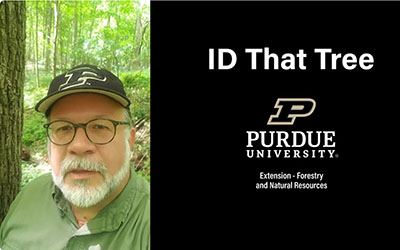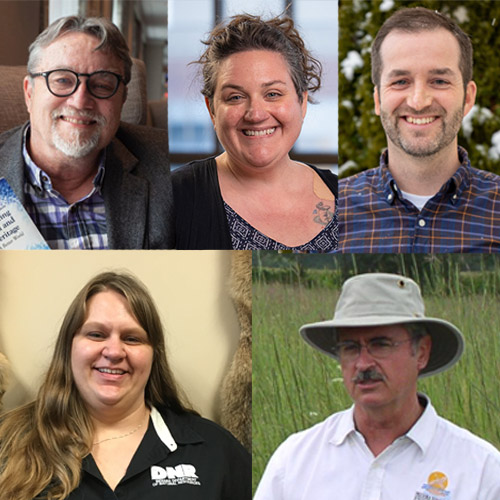1958 Alumnus Julian Hutchinson Publishes New Book
At age 94, Julian “Hutch” Hutchinson, a 1958 Purdue Forestry and Natural Resources alumnus, has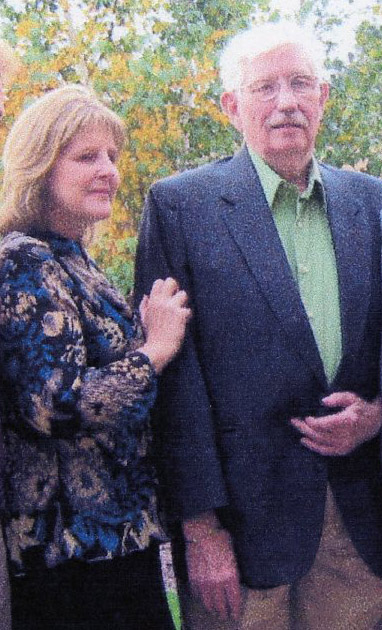 published his 10th book “American Hero: A Historical Novel.”
published his 10th book “American Hero: A Historical Novel.”
According to its Amazon summary: The book follows the life of Union General Elon Farnsworth, killed on the second day at Gettysburg, in the form of Jack Ashworth and his adventures at killing a grizzly at age eleven, at college, the Utah War, life with the Pawnee, Sioux, Black Hills, the Fetterman Massacre and Custer’s Last Stand. Jack serves as Forage Master for the Utah Detachment until he meets the daughter of a Pawnee Chief. He leaves the detachment hoping to use his abilities as a magician to have “big medicine” and prevent war between the Indians and the Government. He meets Crazy Horse and Sitting Bull and plays a defining role in the Fetterman Massacre and Custer’s Last Stand. The book is available on Amazon.
Hutch has found modest success as a self-published author in the years since his retirement after 60 years as a forester and natural resource consultant. But his own fascinating life story shifted when the Frankfort, Indiana, native came to Purdue as a freshman in 1949 at the encouragement of his Aunt Leah K. Patrick. Hutch’s road since has been full of adventures and ups and downs, much like the characters in his books.
“After I graduated from high school, I worked in an aluminum plant,” Hutch explained. “I lived with my aunt and uncle as my parents were dead. Aunt Leah asked if I had thought about college and I said no, not really. She said, well, why don’t you? Aren’t you interested in the trees? I said yes, and the next day coming home from work I stopped at the high school and asked them if they knew of any place that had a forestry school. They gave me some literature on Purdue, located just 25 miles away. In a couple of days I called and for a great sum of $135 I registered. Two months later, I was a freshman.
“But, after the Korean war began in the summer of 1950, I returned to school as a sophomore with a poor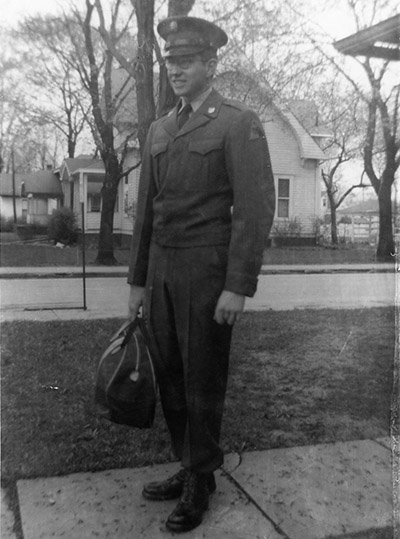 attitude as I was certain I’d be drafted and probably killed. I dropped out, volunteered for the draft, served 24 months, including 16 months in Korea, and returned to civilian life without a scratch. However, I had no intention of returning to Purdue. Such a waste! But an experience did change my life, and I did return to school.”
attitude as I was certain I’d be drafted and probably killed. I dropped out, volunteered for the draft, served 24 months, including 16 months in Korea, and returned to civilian life without a scratch. However, I had no intention of returning to Purdue. Such a waste! But an experience did change my life, and I did return to school.”
After returning from duty, Hutch initially was going to pool money with a couple of fellow service members to start a resort in the Upper Peninsula, but an economic downturn forced the group to get jobs wherever they could. Hutch was hired by a paper company in the North Woods of Wisconsin as a swamper in the fall of 1953. A swamper was a laborer hired to clear out the brush and trees to make way for a team of horses to get through during harvest season.
“There were no bulldozers; we had horses and crosscut saws, that was it,” Hutch recalled. “My job as a swamper was to take an ax, find out where the logs were and clear a path for the horses to get to it. Then the teamsters would turn the horses around and hook up the logs, take them to the landing and come back and get the next one. I spent one winter there and that’s what changed my life.”
While living in the tar-paper barracks, he met a fellow swamper named “Frankie Milwaukee,” who was in his mid-50s but could not read or write. When Frankie was let go during spring layoffs in 1954, Hutch realized he would share a similar fate if he did not get an education, so he called Purdue to come back to school with just 20 days remaining before his GI bill ran out. The May 2024 edition of One Page Stories, features “A Tragic Life Lesson,” which details the experience that led to his return to finish his degree at Purdue.
Dr. Martell, then the dean, requested a personal interview to make sure Hutch had matured and could “cut the academics.” After their conversation, Martell said he believed Hutch had changed for the better and authorized his return, beginning in the second semester of 1956. From that point on, Hutch excelled as a non-traditional student, posting a 3.5 grade-point average and passing classes such as organic chemistry and physics, which he had failed previously, with A's and B's.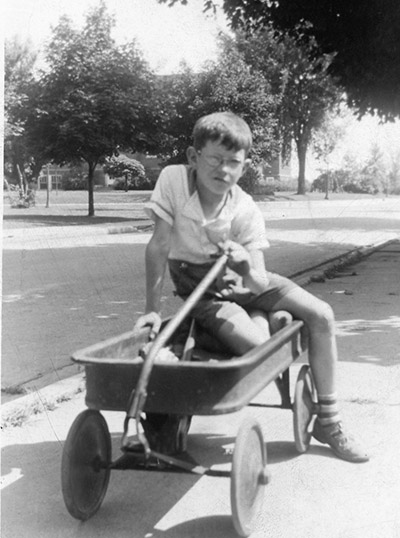
Hutch’s standout memories from Purdue include an overnight trip to Kellogg Bird Sanctuary and other wildlife areas with Dr. Durward Allen’s wildlife course.
“We knew we were going to get there and then have to fix a supper meal over the campfire and sleep in a tent so that we could see the birds at the crack of dawn,” Hutch recalled about the Kellogg trip. “A million birds were suddenly going to come awake in the flyway during fall migration. I wish I had the words to adequately describe that event -- when we crawled up this embankment, looked over it and saw a million birds out there getting ready to fly off.
“But anyway, a lot of the guys just had TV dinners they heated over the fire, but I brought a two-pound spring chicken. When they saw me take out the chicken, they started laughing. But I cut a big pole about 10 feet long, rammed it up inside the chicken and made another pole with a fork in it and laid the pole over the fork until the chicken was right over the fire. I would turn it every little bit and it started dripping grease and smelling good. Then everybody changed their tune. I think that was when they began to accept me, an older guy, a bit more.”
Experiences with Dr. Charlie Miller and Dr. Don Blaine also provided highlights. Hutch recently wrote the following short story about Miller.
“Several memories are as vivid in my mind as if they were yesterday. At the top of the list are those about Charlie Miller. We never called him Dr. Miller. It was always ‘just Charlie.’ He was a friend, father, leader and teacher. A veteran of World War II, never harping, always helping. He gave us one special lesson at Summer Camp, which was then held at Henryville in the Clark County Forest. The last week’s talk was “Throw Charlie in Schlam Lake.” We had our chance on the last night. About 10 of us, fresh from the quarter barrel, caught him as he returned from a shower. He only had on a pair of shorts and carried a towel, soap and toilet kit. At the door of his tent, we surrounded him, hollering, “Throw him in Schlam Lake! Throw him in Schlam Lake.” In a soft voice barely heard above the din, he replied, “You boys don’t want to do that.” We edged closer and kept repeating, “Throw him in the lake.” He was calm. Firm. In charge. “You boys don’t want to do that. It would be so childish.” The three of us in front were Korean War vets. Tough. All one of us had to do was grab an arm and 10 others would carry him to the lake. But we didn’t. I’ll never forget those words, “You boys don’t want to do that.” And we never did. We walked away, muttering to ourselves. The lesson he gave was “how to be a leader.”
Professor Blaine taught surveying and, due to his career experiences, Hutch became a de facto teaching assistant or advisor.
“I had experience surveying in the Army, having gone to a nine-week course at Fort Belar for surveying and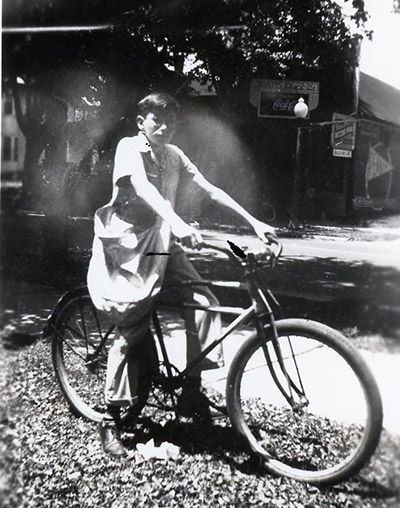 worked as a surveyor in Iron River, Michigan, so the course was easy for me,” Hutch explained. “I was older than the other kids too, so if things came up that they didn’t understand, the other students always came to me. That made me feel good. I had all of this experience working in the woods, so it was such a joy every morning to go to school and learn forestry.”
worked as a surveyor in Iron River, Michigan, so the course was easy for me,” Hutch explained. “I was older than the other kids too, so if things came up that they didn’t understand, the other students always came to me. That made me feel good. I had all of this experience working in the woods, so it was such a joy every morning to go to school and learn forestry.”
Another standout memory for Hutch involved an elective course on interviewing.
“I returned to Purdue in 1956 after the disastrous year 1951, when I flunked three courses in both semesters. This time I was determined to work hard and accomplish high grades. I had been told verbal communication was one of my weak points, so I signed up for the only speech elective available - Basic Interviewing. The class had several forestry students.
The professor was an elderly gentleman with grey hair and a little paunch. The word was he flew into Purdue three times a week just to teach this speech class. And could that man ever teach! The first day he explained that we all use basic interviewing every day of our life. He pointed out that our relationships – spouses, siblings, parents, bosses, and yes, professors – were face-to-face, like an interview.
In the first class, he told us to introduce ourselves. I wanted him to remember me, so like a smart ass, when my turn came, I said, “I’m married with 2 7/9 children.” He got the joke right away that my wife was 7 months pregnant. In a later class, he told us that desks can serve as an obstacle and that it is sometimes necessary to get around it to win our point of view. Several classes later, we were supposed to interview for a job. When my turn came, I didn’t sit in the chair but moved it behind the desk alongside of him. He smiled, knowing I had paid attention.
My best day was when we were assigned to sell a product. I knew I wanted to sell a ballpoint pen! I walked back and forth in front of the class and began a dry speech about the pen’s favorable points: never run out of ink, waterproof, low cost, etc. Then I said, “This pen can also be used for self-defense.” Now, everyone began to pay attention.
I said, “When your attacker comes at you, all that is necessary is to pull back the clip and release it.” I did that, igniting the .32 blank cartridge in the pen. A three-foot stream of fire shot toward the ceiling and gave a roar! The windows rattled, and the janitor came running to see what had happened! I got an A for the day!”
Another key memory from his time at Purdue involved his wife Pat, who he met on a blind date at Pappy’s Sweet Shop and was married to for 52 years until her death in 2007.
“The Purdue University Junior-Senior Prom in 1957 was held in the spring before I married my wife, and I wanted to impress her. The Purdue prom was a big deal and did just that! Pat loved to dance and was very excited and enthralled by the pageantry. The dance was held in the Purdue Memorial Union’s three huge ballrooms. Anyway, as you can imagine, the three bands - Benny Goodman, Glen Miller and Hal McIntyre - certainly got her attention. There wasn’t AC in 1957 and it became quite warm with 3,000 couples huffing and puffing! We would dance to one band and then go into another ballroom and dance to another. The double doors of one ballroom led outside to a veranda with a concrete wall. We would dance and then sit on the cool concrete for a while. Then dance some more.”
After graduation in 1958, Hutch was interviewed by the Wisconsin Conservation Department, now the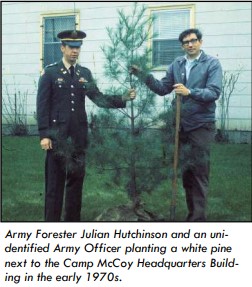 Wisconsin Department of Natural Resources, on campus and was hired as a forester. He was sent to Tomahawk, Wisconsin, as part of the county forest program, to learn the job alongside 20 or 25 other newcomers. Then, each week, Hutch and his fellow foresters were sent to a different county, where they went out to do inventory work on the county forest crop lands.
Wisconsin Department of Natural Resources, on campus and was hired as a forester. He was sent to Tomahawk, Wisconsin, as part of the county forest program, to learn the job alongside 20 or 25 other newcomers. Then, each week, Hutch and his fellow foresters were sent to a different county, where they went out to do inventory work on the county forest crop lands.
Hutch was assigned to Monroe County. He and Pat moved to Sparta, Wisconsin, and had their first child. For the next eight years, he worked as the first forester in Monroe County, assisting private landowners with managing their forest land.
From there, Hutch accepted a position as a forest technician at Camp McCoy (now Fort McCoy), a 60,000-acre military reservation just outside of Monroe County in 1966.
“When I was in Monroe County, most of my work went for naught because of a lack of equipment, but at Fort McCoy, if there was anything we wanted, we got it,” Hutch said. “I had a forestry crew of seven guys that I could do timber stand improvement with. It was such a wonderful thing for me.”
When the lead forester died, Hutch found himself in charge of all land management on the base, including forestry, fish and wildlife and pest control as part of the Department of Defense’s Integrated Natural Resource Program.
“All of a sudden, I was in charge of all of this stuff,” he said. “We had 50 miles of class one trout stream. I inventoried all of the forest land myself, 43,000 acres. I put it on the computer. Ours was the first forest in the state of Wisconsin to go on computer.”
Hutch was at Fort McCoy for 23 years and retired in 1990. His time and work at Fort McCoy was documented in the Forest History Association of Wisconsin’s Chips and Sawdust Newsletters in 2022 and 2023 (Fall and Winter 2022, Spring and Summer 2023) as well as in his own autobiography, Life of a Woodster, published in 2015.
“Forestry was just a natural thing for me,” Hutch said. “After my dad died, my uncles took care of me and took me hunting and fishing, so I had it in my blood. It was a part of my life. I worked in the woods for 60 years until the disease peripheral neuropathy – which makes my feet, hands and legs numb – wouldn’t allow me to be in the woods anymore. I retired for good in 2018. I’m very proud of it. I think I did good work and the world is better because of it.”
After retiring from Fort McCoy, Hutch started his own company, working as a consultant, mostly selling timber, before retiring again 25 years later.
“People had timber to sell, but there were horror stories of loggers that would pay a minimal price, then wreck the woods and take only what they wanted,” Hutch explained. “So, I would mark the trees to be cut, have bid openings where they would sell to the highest bidder – get money on the table – then they would work the harvest. We would make sure it was done in the proper manner and the woods were left in good shape. I usually got 10%. I did other things too, like making management plans.”
Over the years, Hutch got a lot of practice writing, from writing letters and management plans to assist private landowners to writing reports for each of the 17 new programs he created at Fort McCoy. After his retirement in 1990, he had the idea that selling timber was something that needed to be publicized, so he wrote a book about it.
His first book, Hack, was about an old Wisconsin consulting forester, who a Montana ranch family hired to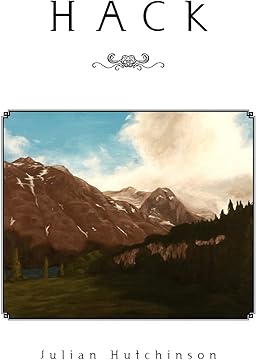 assist in selling timber. The book, published in 2010 and now available through Amazon, combined the sites of his post-retirement travels to the West and his forestry knowledge.
assist in selling timber. The book, published in 2010 and now available through Amazon, combined the sites of his post-retirement travels to the West and his forestry knowledge.
The book’s dedication states:
“I dedicate this story to my loved ones, to fellow foresters, to those who have shed blood for our nation and to three men from long ago – E.O. Hanger, Maurice Black and Lefty DeWald.”
“I love the West – Montana, Wyoming and those places – so I wrote this book about a ranch in Montana that had timber to sell,” Hutch said of Hack. “It was a good story and foresters were interested in it. It was so easy to write that I decided to write another book. The second book was about a guy in theater because my wife and I both were in stage theater for about 30 years, but that one was a dog. It was about a paid assassin. I later reworked it and republished Judge Me Knot again.”
Since then, Hutch has turned out eight more books, including his latest release, American Hero: A Historical Novel, published by Hemmingway Publishers. Hutchinson has persevered through a light stroke and peripheral neuropathy in recent years, but has refused to let them deter his passion for writing and his vivid mind. He is also encouraged to write by Muriel Canfield, his second wife, whom he married 10 years ago.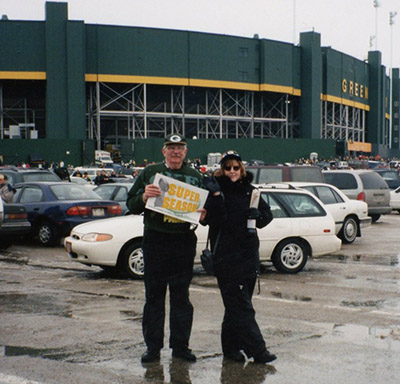 Muriel is a published author in her own right, with four books completed and another, She Fled God, just released by Amazon.
Muriel is a published author in her own right, with four books completed and another, She Fled God, just released by Amazon.
“I’ve always had an imagination,” Hutch explained. “I’m not in it to make money or anything. I just live day to day with my wife. I have four great kids who are old enough to retire. I’ve lived a full life and I’m so lucky. I’m doing well and I feel good about myself.”
A full list of Julian Hutchinson’s books and their summaries are listed below. Hutch also writes short stories, which are often published in One Page Stories, a monthly publication by Bill Boys.
- A Tragic Life Lesson – May 2024
- Hello Korea – April 2024
- Just Henry – March 2024
Books: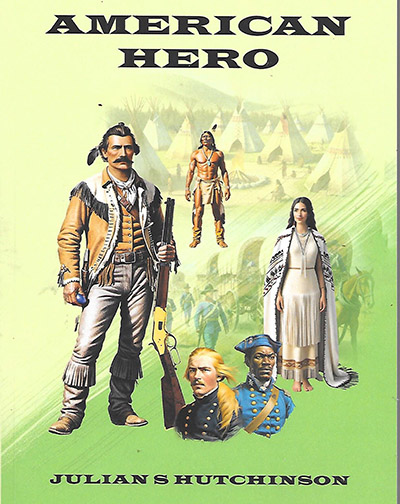
American Hero: A Historical Novel - The storyline follows the life of Union General Elon Farnsworth, killed on the second day at Gettysburg, in the form of Jack Ashworth and his adventures at killing a grizzly at age eleven, at college, the Utah War, life with the Pawnee, Sioux, Black Hills, the Fetterman Massacre and Custer’s Last Stand. Jack serves as Forage Master for the Utah Detachment until he meets the daughter of a Pawnee Chief. He leaves the Detachment hoping to use his abilities as a magician to prevent war between the Indians and the Government. He meets Crazy Horse and Sitting Bull and plays a defining role in the Fetterman Massacre and Custer’s Last Stand. Available on Amazon
Live & Die, 2023, collection of seven stories, self-published, Kindle Press: Available on Amazon
Henry – 2022, civil war historical novel, self-published, Kindle Press: Henry is a multilayered novel of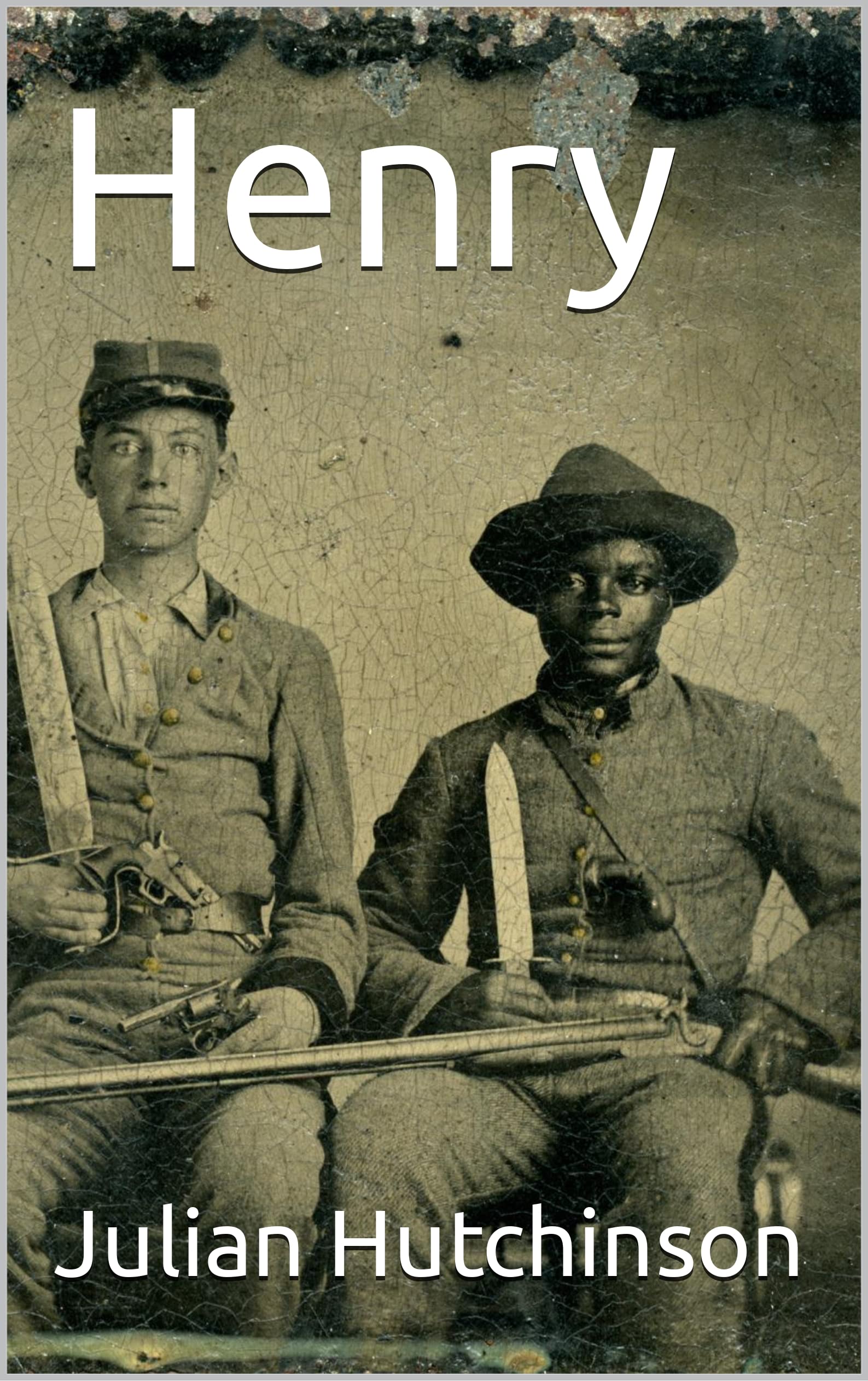 imaginary plus real people living in the Civil War era. The story roves from the Blue Ridge Mountains and Civil War battlefields to the Natchez and Mormon Trails, ending in the Rocky Mountain foothills. Revenge, betrayal, and forgiveness are keystones of the plot. Part One opens in 1862 with the young boys, Henry, aged 14, and Silas, 18, witnessing the wanton killing of their parents by a Union Army Major en route to the Shiloh battlefield. Seeking revenge, they join a Confederate unit. During engagements, Henry undergoes the bewilderment of his first love, the horrors of racism, experiences a religious awakening and is disloyal to his brother who leaves. Book Two features Henry's pursuit of Silas along the Mormon Trail towards the Colorado goldfields. Available on Amazon
imaginary plus real people living in the Civil War era. The story roves from the Blue Ridge Mountains and Civil War battlefields to the Natchez and Mormon Trails, ending in the Rocky Mountain foothills. Revenge, betrayal, and forgiveness are keystones of the plot. Part One opens in 1862 with the young boys, Henry, aged 14, and Silas, 18, witnessing the wanton killing of their parents by a Union Army Major en route to the Shiloh battlefield. Seeking revenge, they join a Confederate unit. During engagements, Henry undergoes the bewilderment of his first love, the horrors of racism, experiences a religious awakening and is disloyal to his brother who leaves. Book Two features Henry's pursuit of Silas along the Mormon Trail towards the Colorado goldfields. Available on Amazon
The Calendar Club – 2021, contemporary novel, self-published, Kindle Press: Are you ready for football? The Calendar Club is a story
about Hollis Maxwell (Max) being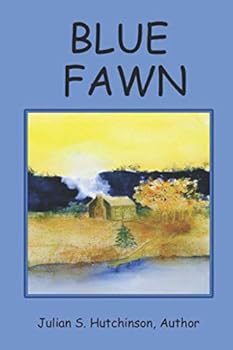 fired and then buying into a worn-down bar, Ollie's Hangout. Unknowingly to Max and Ollie, the CCP, a civic committee, has discovered an NFL franchise is coming to town! And the new stadium will be on the Hangout site. The CCP attempts to buy the bar prior to the NFL announcement. Comedy mixes with greed as Max and Ollie defend their property. Available on Amazon
fired and then buying into a worn-down bar, Ollie's Hangout. Unknowingly to Max and Ollie, the CCP, a civic committee, has discovered an NFL franchise is coming to town! And the new stadium will be on the Hangout site. The CCP attempts to buy the bar prior to the NFL announcement. Comedy mixes with greed as Max and Ollie defend their property. Available on Amazon
Blue Fawn – 2019 - Collection of eight stories, self-published, Kindle Press: The perfect book to take on a boring journey. You’ll find something to tickle your fancy. Long stories and short tales. Yarns of hope, romance, sadness, action, nature, comedy, satire and foolishness. All but one are fiction. And it's stranger than fiction. Synopsis of Contents: BLUE FAWN - A night in the Canadian Wilderness; MAN IN AN ORANGE PLAID COAT - Old friends meet; 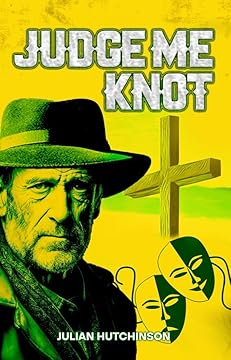 JOE AVERAGE - What is "average"? HOME SWEET HOME - Hope it makes you feel good; CHAIN SAW FOR SALE - lesson in what not to do; WHO LOVES NATURE - Listen and learn; WAIL OF COTTON - Don't get greedy; BAD ASS CREEK - Got to have a western. Available on Amazon
JOE AVERAGE - What is "average"? HOME SWEET HOME - Hope it makes you feel good; CHAIN SAW FOR SALE - lesson in what not to do; WHO LOVES NATURE - Listen and learn; WAIL OF COTTON - Don't get greedy; BAD ASS CREEK - Got to have a western. Available on Amazon
My City, My Church – 2016, a historical work with pictures, self-published, Spart Print Media
Life of a Woodster – 2015, an autobiography, self-published, Sparta Print
My Life Wife Pat – 2012, a memoir, self-published, Sparta Print
Judge Me Knot – 2011, reprinted in 2024. Available on Amazon
 Hack – 2010: Harold Feld, an old Wisconsin consulting forester, is hired by a Montana ranch family to assist in selling timber. Jim, a bachelor, and his spinster sister, Har, operate the large cattle ranch along with their brother, Hack, a Vietnam war veteran suffering from post-traumatic stress. While Harold develops plans for the harvest, he becomes entangled in the personalities of the ranch owners and the dynamics of their lives. He learns that Hack especially has emotional tensions. Harry needs forestry help because of the vast expanse of the ranch. A previous assistant from Wisconsin, Angela, and her young son, Joe, are summoned. Both of them soon develop a fondness for Hack, unaware of his obsession. But love and good forestry conquers all and through romance and friendship, a happy ending is realized. Available on Amazon
Hack – 2010: Harold Feld, an old Wisconsin consulting forester, is hired by a Montana ranch family to assist in selling timber. Jim, a bachelor, and his spinster sister, Har, operate the large cattle ranch along with their brother, Hack, a Vietnam war veteran suffering from post-traumatic stress. While Harold develops plans for the harvest, he becomes entangled in the personalities of the ranch owners and the dynamics of their lives. He learns that Hack especially has emotional tensions. Harry needs forestry help because of the vast expanse of the ranch. A previous assistant from Wisconsin, Angela, and her young son, Joe, are summoned. Both of them soon develop a fondness for Hack, unaware of his obsession. But love and good forestry conquers all and through romance and friendship, a happy ending is realized. Available on Amazon




